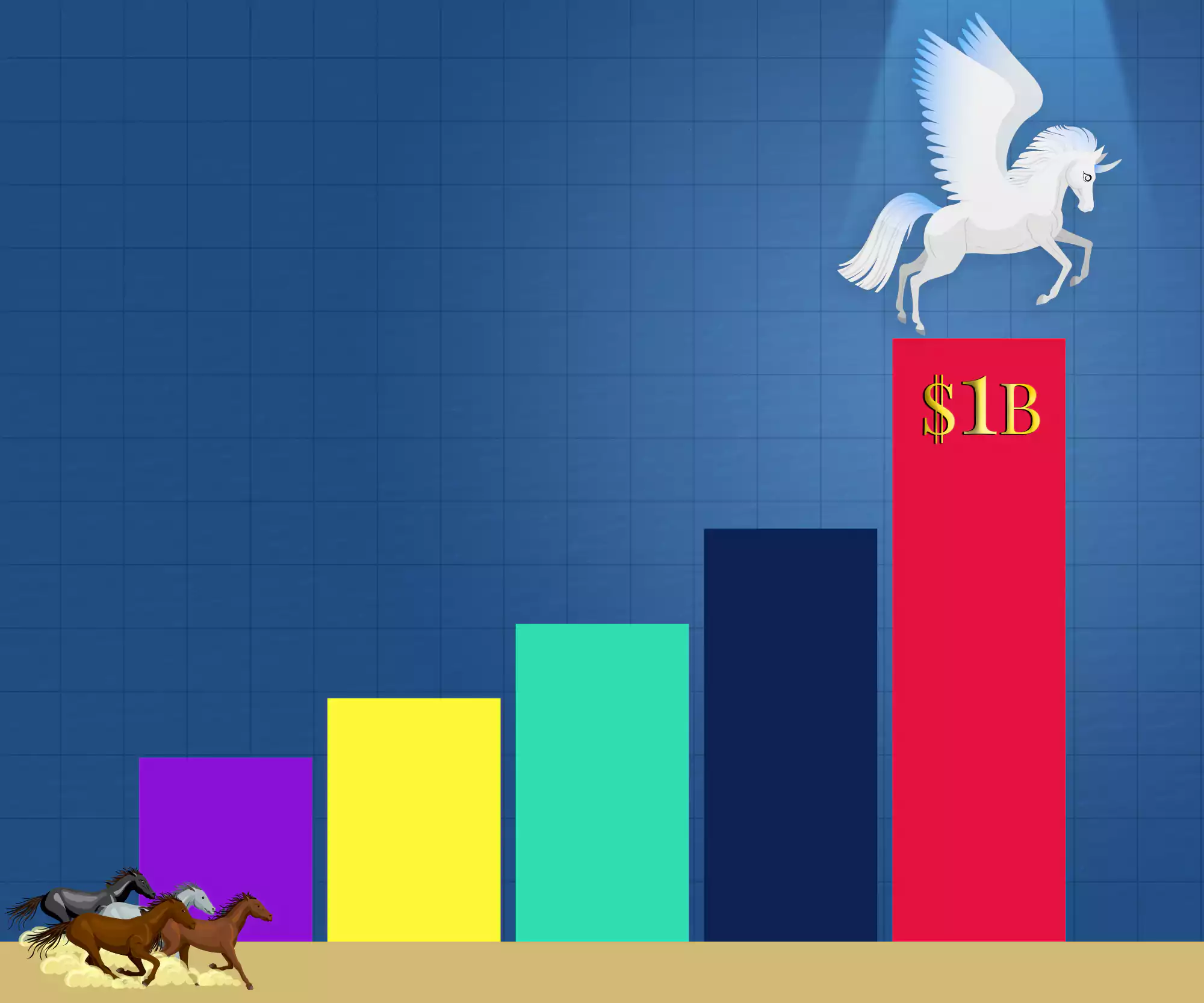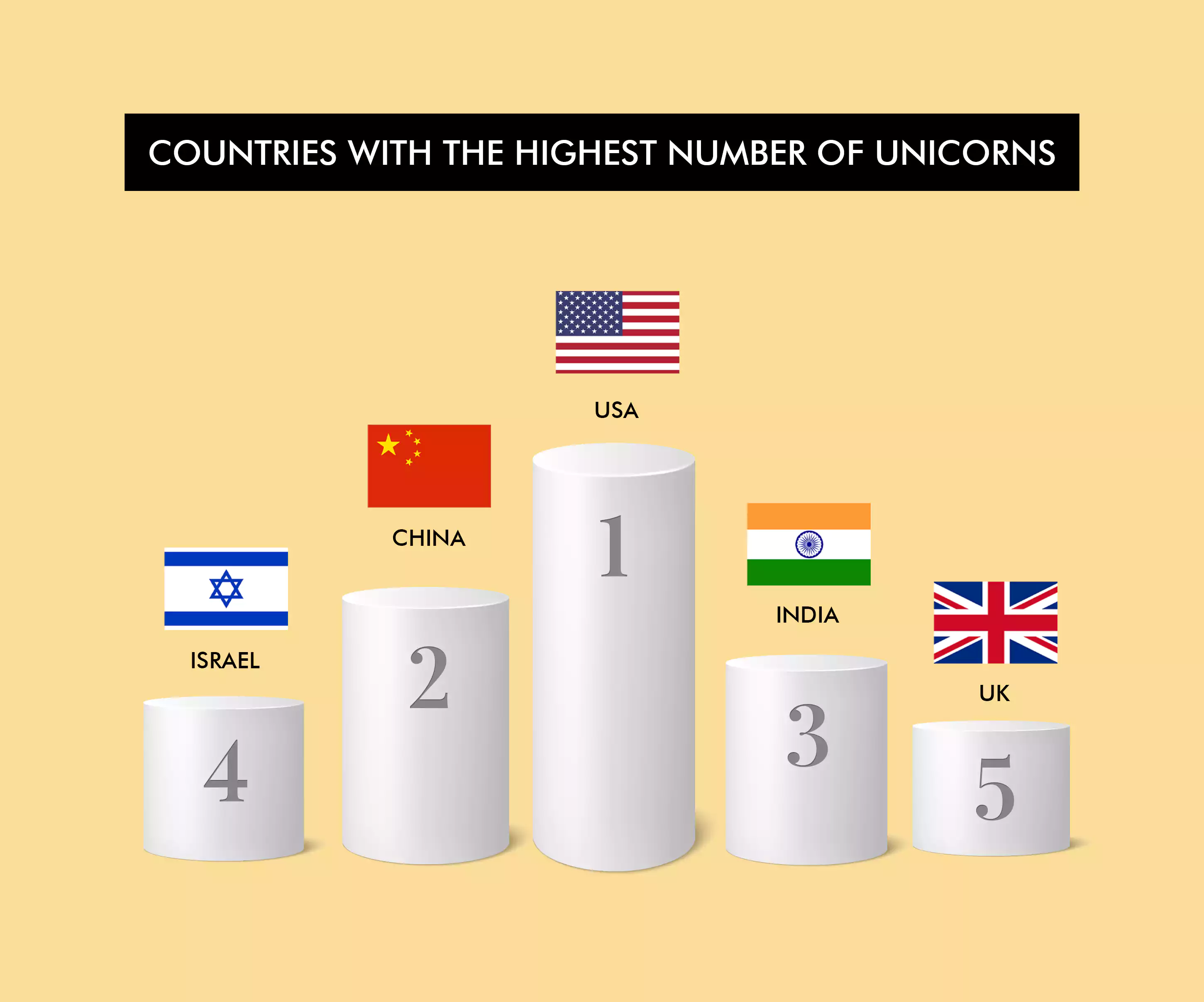
Have you heard of Byju’s, the billion-dollar Indian EdTech company? It’s hardly an unfamiliar name anymore, especially in the Gulf Cooperation Council (GCC) countries which account for more than 30,00,000 of Byju’s enrolments. The UAE, in particular, accounts for 40% of those! In 2018, Byju’s was valued at US$1 billion, boasting 15 million active users and 9,00,000 paid subscribers. At that moment, it became a unicorn company. Let’s discover what unicorn companies are, which country and industry have the highest number of unicorns, and what the future looks like for these mythical beast-like companies.
What is a unicorn company?
Any private company achieves the status of ‘unicorn’ when they bag a valuation of US$1 billion from venture capital.
This term was coined by Aileen Lee, founder of Cowboy Ventures, in 2013. Here, she discovered that only 0.07% of the startups born in the 2000s hit the $1 billion milestone. Seeing only 39 software companies achieving the status, a rarity in itself, she named them unicorns.
But is “unicorn” the only term for startups with a particular valuation?
No!
Apart from unicorns, you also have these guys:
Decacorn: A startup with a nearly $10 billion market cap.
Soonicorn: They aspire to and possess the ability to become a unicorn soon.
Minicorn: As the name suggests, these companies are in the nascent stage of becoming a unicorn. They hold a valuation of over $1 million.
Hectocorn: The most superior of all, also known as “super unicorns,” are companies with a valuation of over $100 billion.
The rise of the unicorn era
The term ‘unicorn’ was new in 2013, and its novelty is soon fading. Though it is still a difficult title to bag, the numbers over the past five years indicate that startups supported by investors have surged by over 1,00,000. The pandemic must be credited here. Through the work-from-home culture and technological innovations that COVID-19 necessitated, many were encouraged (or even forced) to become their own paymasters by entering the race of entrepreneurship.
If your idea has a vision, a sustainable USP, and the potential to script history, you need to attract investors. Thousands of startups kick off in various parts of the globe every month, but do they all make it to the $1 billion mark? No.
Even though there are tons of think tanks in the world, developing a product that grabs the attention of billions of people requires tremendous effort. But, according to PitchBook (a global database of business analytics), a combination of private and market capitalisation is paving the way for the faster growth of unicorns.
Which country has the most unicorn startups?
CB Insights (a platform similar to PitchBook) revealed earlier this year that there are over 1,068 unicorn startups worldwide. Even though most countries have a trace of startups, these are the main frontiers:

However, the UAE is not so far behind. It is emerging as one of the prime and prominent locations for technology-based entrepreneurs. Above all, the government is also preparing a conducive environment for startups by offering tax breaks.
The UAE is a hub for tech-lovers because it is galloping ahead in innovation and technology, leaving the rest of the world spellbound. So naturally, the country is home to a vast skyline of unicorn companies. Some renowned ones are Vista Global, Kitopi, and Emerging Markets Property Group.
As the above infographic shows, currently, the US stays at the top in terms of the country with the most unicorns. But, how come? There is no specific answer to such a booming trend, but multiple factors drive it. As a globally acknowledged superpower, the US has had little trouble staying ahead of the rest of the world in most regards. As such, it was hardly a surprise when they broke the economical mould and planted their flag at the peak of entrepreneurship.
Airbnb, Uber, Alphabet (Google’s parent company), and Meta (formerly known as Facebook) are a few of the classic unicorn achievers from the US. While some remain unicorns, others have paved their way to becoming the decade’s super unicorns.
Which industry has the most number of unicorns?
Now, when we talk about the highest-grossing industries in the unicorn world, these come to mind:
FinTech: We are all aware of Stripe. It is a fintech unicorn that has empowered millions across the globe to transact money irrespective of the currency type. Innovations like this in finance have brought similarly successful business models to life. Thus, FinTech is responsible for inspiring masses of business ventures, many of which have gone on to claim the unicorn status. That explains why over 15% of unicorns are fintech companies.
E-commerce: After FinTech, the unicorn club is reigned by the eCommerce players at 13%. Its direct-to-consumer (D2C) market guarantees its high viability. Moreover, e-commerce’s Thrasio model of acquiring high-potential startups makes it a Mecca for building unicorns.
Other industries in the race are robotics, artificial intelligence, and healthcare, which account for over 8%.
Thus, any startup that challenges the existing, renowned companies, disrupts the market status quo, is future-friendly, and attracts investors can become a unicorn.
The future of unicorn companies
Countries help those who aspire to be part of the unicorn club by reviving the economy and making themselves future-ready. For instance, the UAE intends to be a power station for over 20 startups or unicorns by 2031. And, adding power to their vision, authorities have rolled out an Entrepreneurial Nation initiative. This initiative provides multiple public-private partnerships and assists entrepreneurs in building their base in the UAE and expanding globally.
Another approach taken by the UAE is the introduction of the Skill-Up Academy. This programme provides entrepreneurial skillsets to people from different walks of life who are passionate about building their brands. Furthermore, this initiative will provide subsidies, products, and assistance to support startups in the UAE.
That’s the beauty of unicorn companies. They model an achievable business utopia, connecting fantasies of extraordinary success with the realities of humble beginnings.



